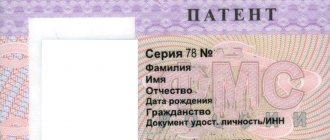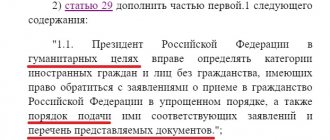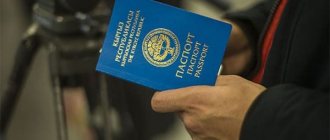The essence of the law
The legal act contains principles related to citizenship of the Russian Federation, regulates relations associated with this status, determines the procedure for obtaining and terminating it. This area is also regulated by the Constitution of the Russian Federation and international treaties.
Obtaining citizenship
The law establishes a general and simplified registration procedure. In the standard procedure, capable foreigners and stateless persons who are over 18 years old can apply for citizenship (Article 13 of Federal Law No. 62).
The period of residence on Russian territory must be at least 5 years, and you cannot travel for more than 90 days per year. This period is reduced for those who have special merits in the field of science, technology, are recognized as refugees and in other situations.
Children's status is issued on the basis of an application from their parents; from the age of 14, the child is already asked if he agrees to become a Russian citizen.
Relaxations have been made for the following categories of applicants:
- has been married to a Russian citizen for at least 3 years;
- had USSR citizenship;
- has one of the parents who is a citizen of the Russian Federation.
A nod was also made to those who, after July 1, 2002, studied according to Russian educational programs and worked for at least 3 years, which is confirmed by contributions to the Pension Fund.
A child is accepted under a simplified procedure if the mother or father are Russian citizens. In this case, there should be no objections from the other party.
Accommodation for foreigners
According to statistics, our country is experiencing a large influx of migrants. Federal Law No. 62 pays attention to their rights and the procedure for obtaining a temporary residence permit (TRP). This document gives the right to legally live in Russia until receiving a residence permit.
The temporary residence permit is issued subject to a quota approved annually. Admission without taking into account this restriction is carried out if there are grounds for it. For example, natives of the RSFSR who had a Soviet passport.
About the new law on citizenship of the Russian Federation - what changes in 2021
Information from the website dedicated to the Resettlement Program
The President has made it easier for Ukrainians and others to obtain Russian citizenship. New law in 2021
On December 28, 2021, the Federal Law on Amendments to the Citizenship Law was published. A document about which so much has been spoken and written in recent days. The changes take effect on March 29, 2021. All news feeds described this, at that time still a bill, with loud headlines such as “It will be easier for Ukrainians to obtain Russian citizenship , “It will be easier for Ukrainian citizens to obtain Russian citizenship , “Simplified acquisition of citizenship for residents of Donbass,” etc. Let's figure out what will change now. Based on the text of the officially published document, the following conclusions can be drawn:
It is becoming easier for compatriots to obtain Russian citizenship
In this context, compatriots are understood as participants in the compatriot resettlement program. From March 29, 2021, participants in the state program can apply for citizenship not only at the place of registration at the place of residence, but also at the place of stay, that is, according to migration registration. What does it mean? Previously, it was possible to apply for citizenship only if you had a certificate of participation in the state program, a temporary residence permit and registration under the temporary residence permit. Now it is not necessary to register under a temporary residence permit, and you can apply for citizenship with registration (migration registration) in hand. And, it should be noted that for a number of compatriots this procedure will really make it easier to obtain citizenship, as it will reduce one stage of paperwork, which is undoubtedly good news. If you do not yet know what the resettlement program for compatriots is, you can find detailed and up-to-date information on obtaining Russian citizenship under the resettlement program at the link
This change applies not only to citizens of Ukraine, but, in principle, to all participants in the state program, regardless of their citizenship.
For citizens of Ukraine planning to obtain Russian citizenship, a separate article is presented on our website with a detailed description of obtaining Russian citizenship under the program for the resettlement of compatriots in 2021 by citizens of Ukraine
Obtaining citizenship is being simplified for certain categories of citizens
With this point everything is a little more complicated. Literally, the amendment reads as follows: “The President of the Russian Federation, for humanitarian purposes, has the right to determine the categories of foreign citizens and stateless persons who have the right to apply for admission to the citizenship of the Russian Federation in a simplified manner, as well as the procedure for their submission of relevant applications and the list of documents to be provided. » That is, at the discretion of the President, a certain category of citizens will be determined who will be able to obtain citizenship in a simplified manner. It is not yet clear which category of citizens will fall under this simplification; it will be possible to obtain simplified citizenship for citizens of the DPR and LPR, or for simplified acquisition of citizenship for citizens with temporary asylum. It will be possible to say for sure only after an appropriate clarification or a Presidential Decree appears.
Conclusion . In fact, two significant amendments are being made to the law, which were expected. What didn't happen? It was assumed that for participants in the resettlement program the need to provide a notarized renunciation of existing citizenship would be abolished and, of course, the majority of Ukrainian citizens expected that simplifications would apply to obtaining Russian citizenship in principle, and not only to participants in the resettlement program. But given the number of Ukrainian citizens who annually take part in the compatriot resettlement program, these changes in legislation will indeed simplify obtaining citizenship under the compatriot resettlement program, and we should not forget that clarification on the second point of changes is expected in the near future.
Considering all of the above, for those who want to obtain Russian citizenship, now is the ideal moment.
More details
Share on social media networks:
What opportunities does the law provide?
After receiving citizenship, a person becomes a full member of Russian society. Even in a foreign country, you can count on support if you contact the Russian embassy.
Rights of citizens of the Russian Federation:
- elect power and be elected yourself;
- serve in the Armed Forces;
- hold public service positions;
- receive social benefits;
- place your child in kindergarten or school.
If a Russian citizen leaves the country, he retains his citizenship. Along with rights, new subjects also acquire responsibilities. All citizens must abide by the Constitution, respect the freedoms and rights of others, and pay taxes. It is also necessary to protect the environment and protect the homeland.
Federal Law of May 31, 2002
Adopted by the State Duma on April 19, 2002 Approved by the Federation Council on May 15, 2002 Chapter II. Acquisition of citizenship of the Russian Federation Chapter III.
Termination of citizenship of the Russian Federation Chapter IV. Cancellation of decisions on issues of citizenship of the Russian Federation Chapter V. Citizenship of children when changing the citizenship of parents, guardians and trustees. Citizenship of incapacitated persons Chapter VI. Authorized bodies in charge of matters of citizenship of the Russian Federation Chapter VII.
Proceedings in cases of citizenship of the Russian Federation Chapter VIII. Appealing decisions of authorized bodies in charge of matters of citizenship of the Russian Federation, and the actions of their officials.
Resolution of disputes regarding issues of citizenship of the Russian Federation Chapter IX. Final provisions Article 45.
Entry into force of this Federal Law This Federal Law comes into force on July 1, 2002. President of the Russian Federation V.
Putin
Changes in the law
In 2021, a clarification was made to the legal act stating that foreigners are required to confirm their knowledge of the Russian language, laws and Russian history.
Since April 2021, citizens of some districts of the Luhansk and Donetsk regions will be granted citizenship under a simplified scheme.
In 2021, changes were made to Art. 28 Federal Law No. 62. The President received the right to determine categories of citizens who can become Russian citizens according to a simplified scheme. He also establishes for them a list and procedure for submitting documents.
Who can use the simplified procedure
The new law on obtaining citizenship in Russia in 3 months came into force in September 2021. The main changes affected the preferential scheme for entering civil status. Foreigners can use a simplified scheme:
- former citizens of the Soviet Union born on the territory of the RSFSR;
- have at least one parent who has the status of a citizen of the Russian Federation;
- stateless persons born in the USSR;
- married to a Russian citizen;
- having incapacitated children with Russian civil status;
- participants in the state program for the return of compatriots to their homeland.
From 01.09.2019 Art. 14 of the Federal Law on Russian citizenship has undergone changes. An addition was made to it to make it easier for applicants with Ukrainian civil status to obtain Russian citizenship.
Benefits for students
The presidential decree on Russian citizenship contains a clause that states that former students of Russian universities have grounds to take advantage of the simplified scheme for gaining citizenship. The educational institution must have state accreditation. It is important to meet the following conditions: education was received after July 1, 2002, and the applicant for Russian citizenship has at least 3 years of work experience. Obtaining Russian citizenship by students is possible if they have a diploma, a work record book, a work contract, and information about pension insurance.
Conditions for businessmen
For persons running a private business in Russia for three or more years, the 2021 amendments to the Russian Citizenship Law provide greater preferences. This category of foreigners can obtain Russian citizenship using a simplified procedure by presenting the following documents:
- extract from the register of individual entrepreneurs;
- data on the payment of taxes for the last 3 years (excluding land, transport tax, property tax, state duties, refunds of overpaid amounts);
- confirmation of contributions to the Pension Fund;
- if the applicant for Russian citizenship is an employer - information about making contributions to the Pension Fund for employees.
If there are supporting documents, an individual entrepreneur can count on benefits when obtaining Russian citizenship in accordance with the mentioned law.
For investors in the economy
Many foreign businessmen invest money in the Russian economy and organize jobs for Russians. The development of legislation on citizenship in the Russian Federation has led to the fact that investors have the right to formalize state affiliation with the Russian Federation according to a simplified scheme. This opportunity can be taken advantage of by those foreign businessmen who have invested an amount equal to or exceeding 10 million rubles. The company in whose authorized capital this amount was contributed must pay taxes and pension contributions of 6 million rubles or more.
As a result of employment

Those foreigners who work in Russia can also obtain Russian citizenship on preferential terms. They have the right to count on benefits when obtaining Russian citizenship if the period of their official work is at least three years, and the specialty is included in the list of professions of foreigners who have the opportunity to obtain Russian civil status under a simplified scheme.
Subtleties of obtaining citizenship
The process of obtaining the desired status takes time. It is necessary to collect the entire extensive package of documents and pay a fee, which amounts to 3.5 thousand rubles. You should also undergo an interview with a special commission, where it is important to confirm your knowledge of the Russian language.
Documents are submitted to the department of the Ministry of Internal Affairs located at the place of residence. If the applicant lives outside the Russian Federation, then you can contact the Russian embassy or consulate.
The Law “On Citizenship” is a real Bible for those who want to become a Russian citizen. It establishes the legal basis for registration and makes it possible for certain categories of applicants to enjoy privileges. The applicant must be prepared to undergo checks and provide additional certificates upon request from the competent authorities.
Lawyer Anna Vladimirovna Krapivnitskaya.
Article 13
1. Foreign citizens and stateless persons who have reached the age of eighteen years and have legal capacity have the right to apply for admission to citizenship of the Russian Federation in the general manner, provided that these citizens and persons: b) undertake to comply with the Constitution of the Russian Federation and the legislation of the Russian Federation ; c) have a legal source of livelihood; e) speak Russian; the procedure for determining the level of knowledge of the Russian language is established by the regulations on the procedure for considering issues of citizenship of the Russian Federation. 2. The period of residence on the territory of the Russian Federation established by paragraph “a” of part one of this article is reduced to one year if at least one of the following grounds is present: a) - c) excluded.
— Federal Law of 11.








